April 2020
The following report describes how the coronavirus and lockdown affect loneliness and anxiety between age groups and gender.
The report is based on a survey that included 1,228 adults (80% from the US, the UK, Canada, and Australia) and was conducted by the company SocialSelf through an email survey (52% of respondents) and Amazon Mturk survey (48% of respondents) from April 1 through April 6, 2020.
How We Define Coronavirus Loneliness
In this study, we asked the question, “Do you feel more lonely because of the coronavirus?” The alternatives presented to respondents were Always, Often, Sometimes, or Never.
Respondents who chose Always or Often were categorized as experiencing coronavirus loneliness.
At a Glance
-
- Coronavirus loneliness is 70% more common among millennials than baby boomers.
- One in three respondents in the US is affected by coronavirus loneliness.
- Coronavirus loneliness affects 1 in 3 men compared to 1 in 4 women.
- Coronavirus loneliness affects millennial men most.
- Coronavirus loneliness isn’t just emotional: people who are lonely due to coronavirus isolation report worsened relationships three times as often as those not lonely.
- People who are lonely because of the coronavirus are more likely to have tried reaching out to others.
- Nine in ten feel more anxious because of the coronavirus
- Younger generations relieved not having to socialize — baby boomers not so much
- Young people worry about going back into society after the lockdown
- Younger generations’ social anxiety might make them appreciate the lockdown more
- People with social anxiety are relieved not having to socialize and are worried about returning to society
- Women are more anxious than men about the coronavirus crisis
1. Coronavirus Loneliness is 70% More Common Among Millennials Than Baby Boomers
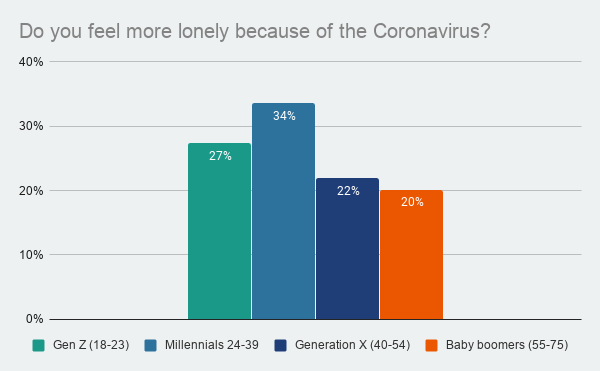
Thirty-four percent of millennials always or often feel more lonely because of the coronavirus situation. This is 70% higher than baby boomers, where the corresponding number is 20%.
I have definitely been lonely. I think I was teetering on depression there for a week or two, but luckily, I have made some new acquaintances and friends while playing video games and that has honestly kept me sane. Also, VR helps a LOT. I can be anywhere in the world while still safe in my apartment.
– Alice
I am 71 years old and still working part-time 4 days a week as a Nurse. At home, I keep myself busy at all times. Meditation is a big part of my routine. I play a lot of music from Youtube, teach myself piano, and or keep busy with 2 grandchildren. I let the other person in the house do all the shopping as I do not want to get sick.
– Jennifer, Australia
Table 1.1: Distribution of responses between age groups
Question: Do you feel more lonely because of the coronavirus?
| 18-23 n. | 18-23% | 24-39 n. | 24-39% | 40-54 n. | 40-54% | 55-75 n. | 55-75% | |
| Always/Often | 73 | 27% | 181 | 33.6% | 55 | 22% | 32 | 20% |
| Always | 20 | 7% | 53 | 9.8% | 14 | 6% | 9 | 6% |
| Often | 53 | 20% | 128 | 23.7% | 41 | 16% | 23 | 14% |
| Sometimes | 128 | 48% | 251 | 46.6% | 114 | 45% | 82 | 52% |
| Never | 66 | 25% | 107 | 19.9% | 82 | 33% | 45 | 28% |
| Totals | 267 | 100% | 539 | 100% | 251 | 100% | 159 | 100% |
Grayed-out numbers do not represent a wide enough cross-section of the target population and cannot be reported.
2. One in Three Respondents in the US is Affected by Coronavirus Loneliness
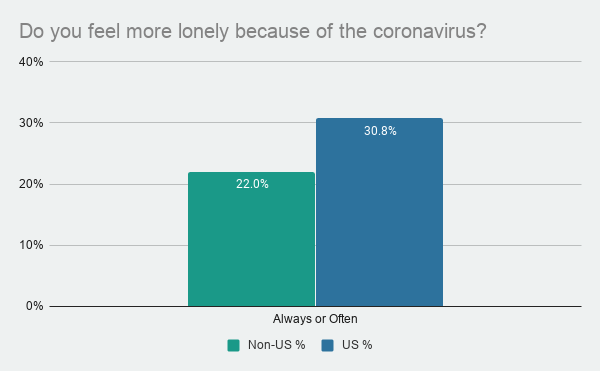
Of US respondents, 30.8% always or often feel more lonely because of the coronavirus situation. This is 40% higher than the worldwide non-US average of 22%.
Table 2.1: Distribution of responses of US and non-US respondents
Question: Do you feel more lonely because of the coronavirus?
| Non-US n. | Non-US % | US n. | US % | |
| Always or Often | 87 | 22.0% | 255 | 30.8% |
| Sometimes | 207 | 52.4% | 372 | 45.0% |
| Never | 101 | 25.6% | 200 | 24.2% |
| Totals | 395 | 100.0% | 827 | 100.0% |
As seen in Table 2.1, a larger percentage of non-US respondents sometimes feel lonely because of the coronavirus situation (52.4% versus 45.0%). The difference between non-US and US respondents is much smaller for those who are never lonely (25.6% versus 24.2%).
Additional Loneliness Resources
3. Coronavirus Loneliness Affects 1 in 3 Men Compared to 1 in 4 Women
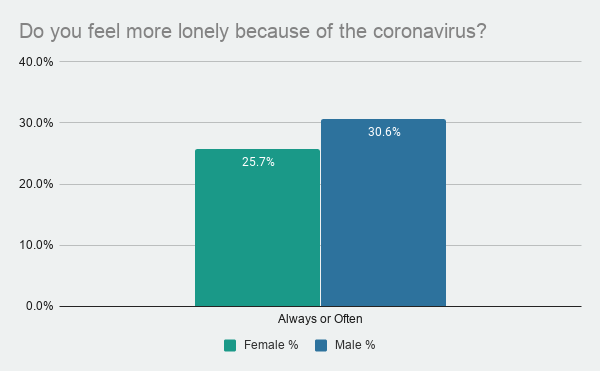
The diagram shows that 30.6% of men compared to 25.7% of women always or often feel more lonely because of the coronavirus situation.
Table 3.1: Distribution of responses between genders
Question: Do you feel more lonely because of the coronavirus?
| Female n. | Female % | Male n. | Male % | |
| Always or Often | 170 | 25.7% | 165 | 30.6% |
| Sometimes | 330 | 49.9% | 240 | 44.5% |
| Never | 161 | 24.4% | 134 | 24.9% |
| Grand Total | 661 | 100% | 539 | 100% |
No significant difference was recorded between genders of those who answered that they are never more lonely because of the coronavirus situation (24.4% women versus 24.9% men). However, more women than men answered that they are sometimes more lonely (49.9% versus 44.5%). This difference corresponds to the opposite gender difference of those who replied always or often (25.7% of women versus 30.6% of men).
4. Coronavirus Loneliness Affects Millennial Men Most
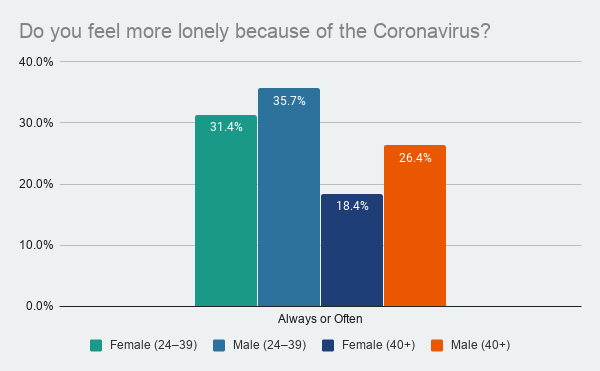
In this diagram, the data is split between gender and age group, comparing millennials to people 40 years of age and older.
Coronavirus loneliness is most prevalent among millennial men, with 35.7% always or often feeling lonely. In comparison, 31.4% of millennial women are always or often lonely. It is least prevalent among women 40 years old and older, with 18.4% feeling more lonely. Men who are 40 years of age or older score 26.4% on the same measurement. The gender difference in loneliness is larger in older generations than among millennials (26.4% versus 18.4% compared to 35.7% versus 31.4%).
Table 4.1: Distribution of responses between genders and age groups
Question: Do you feel more lonely because of the coronavirus?
| Female 24–39 n. | Female 24–39 % | Male 24–39 n. | Male 24–39 % | Female 40+ n. | Female 40+ % | Male 40+ n. | Male 40+ % | |
| Always or Often | 80 | 31.4% | 99 | 35.7% | 49 | 18.4% | 38 | 26.4% |
| Sometimes | 122 | 47.8% | 124 | 44.8% | 134 | 50.4% | 64 | 44.4% |
| Never | 53 | 20.8% | 54 | 19.5% | 83 | 31.2% | 42 | 29.2% |
| Grand Total | 255 | 100.0% | 277 | 100.0% | 266 | 100.0% | 144 | 100.0% |
While loneliness is highest among millennial men who responded to the survey (35.7%), across the board, a higher percentage of people feel occasionally lonely during the coronavirus situation. About twice as many people are sometimes lonely during the coronavirus situation than are always, often, or never lonely.
5. Coronavirus Loneliness Isn’t Just Emotional: People Who Are Lonely Due to Coronavirus Isolation Report Worsened Relationships Three Times as Often as Those Not Lonely
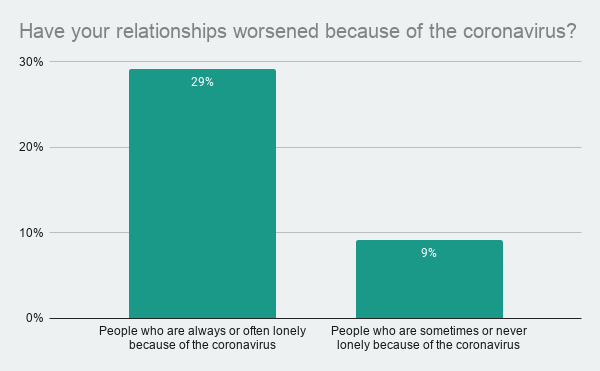
People who say they are always or often more lonely because of the coronavirus situation also say their relationships have worsened in more cases (29%) than those who are sometimes or never lonely (9%) because of the current situation. People who experience more loneliness caused by the coronavirus situation report more adverse effects on their relationships than others who haven’t been hit as hard by coronavirus loneliness.
When things were normal I was too busy to worry about who I was still in contact with or who I would send a text or call myself. I always wonder why people don’t seem to be the first to ask me out or ask me how I am doing. It has always seemed 99% my effort.
So having stopped everything in my life, it’s really hit home how little I communicate with friends and family outside my immediate household and workplace. It’s given me a chance to think about how I can get better at communicating with friends, because I don’t want to be forgotten or left out.
– Charles
Table 5.1: Distribution of relationship quality among lonely and not lonely respondents because of the coronavirus situation
Question: Have your relationships worsened because of the coronavirus?
| All n. | All % | Lonely* n. | Lonely* % | Not lonely* n. | Not lonely* % | |
| Mostly or Significantly improved | 241 | 20% | 73 | 21% | 167 | 19% |
| Mostly or Significantly worsened | 181 | 15% | 100 | 29% | 80 | 9% |
| About the Same | 802 | 66% | 170 | 50% | 630 | 72% |
| Grand Total | 1224 | 100% | 343 | 100% | 877 | 100% |
*Lonely respondents are defined as those who always or often feel lonely because of coronavirus isolation. Not lonely respondents are defined as those who never or sometimes feel lonely because of coronavirus isolation.
Most respondents did not see a significant change in the quality of their relationships due to coronavirus isolation. However, of those that did, lonely respondents were three times as likely to report that their relationships worsened. About a fifth of respondents across the board reported that their relationships actually improved due to the coronavirus isolation.
6. People Who Are Lonely Because of the Coronavirus Are More Likely to Have Tried Reaching Out to Others
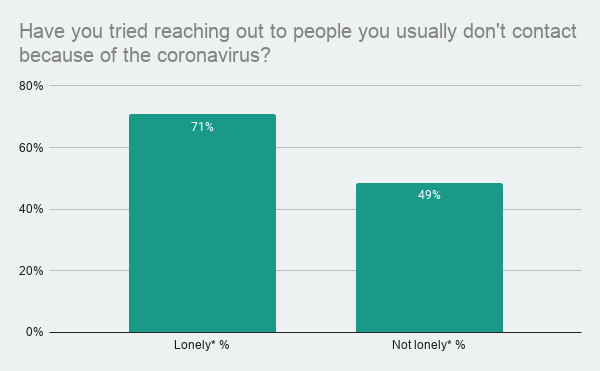
Of the respondents who experienced increased loneliness during the coronavirus pandemic, 71% have tried reaching out to people they usually don’t contact. For people who never or sometimes are lonely, that number is 49%.
Table 6.1: Distribution of lonely and not lonely respondents who are reaching out due to the coronavirus situation
Question: Have you tried reaching out to people you usually don’t contact because of the coronavirus?
| Lonely* n. | Lonely* % | Not lonely* n. | Not lonely* % | |
| Yes | 283 | 71% | 481 | 49% |
| No | 117 | 29.3% | 508 | 51.4% |
*Lonely respondents are defined as those who always or often feel lonely because of the coronavirus. Not lonely respondents are defined as those who never or sometimes feel lonely because of the coronavirus.
Of the lonely respondents, 71% have tried reaching out to people they don’t typically connect with due to the isolation orders during the coronavirus situation. Conversely, of those who are not always or often lonely, a little less than half of the respondents have reached out to others during the pandemic.
7. Nine in Ten Feel More Anxious Because of the Coronavirus
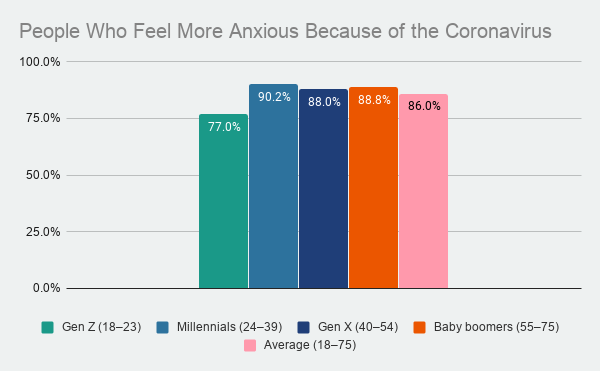
Across all generations, nine out of ten respondents reported increased anxiety due to the coronavirus situation. An astounding 90.2% of millennial respondents between the ages of 24 and 39 reported feeling more anxious due to the effects of the global coronavirus concerns.
Older generations are similarly affected by this anxiety, as 88.8% of respondents between 40 and 54 (Generation X) and 86% of respondents between 55 and 75 (baby boomers) are more anxious because of the coronavirus situation. About 77% of respondents between 18 and 23 (Generation Z) reported feeling more anxious.
Table 7. Do you feel more anxious because of the coronavirus?
| All 18–99 n. | All 18–99 % | 18–23 n. | 18–23 % | 24–39 n. | 24–39 % | 40–54 n. | 40–54 % | 55–75 n. | 55–75 % | |
| Always | 209 | 17.0% | 28 | 10.4% | 102 | 18.9% | 50 | 19.9% | 27 | 16.9% |
| Never | 164 | 13.4% | 62 | 23.0% | 53 | 9.8% | 30 | 12.0% | 18 | 11.3% |
| Often | 355 | 29.0% | 65 | 24.2% | 182 | 33.7% | 72 | 28.7% | 35 | 21.9% |
| Sometimes | 498 | 40.6% | 114 | 42.4% | 203 | 37.6% | 99 | 39.4% | 80 | 50.0% |
| Total | 1,226 | 100.0% | 269 | 100.0% | 540 | 100.0% | 251 | 100.0% | 160 | 100.0% |
8. Younger Generations Are Relieved Not Having to Socialize — Baby Boomers Not So Much
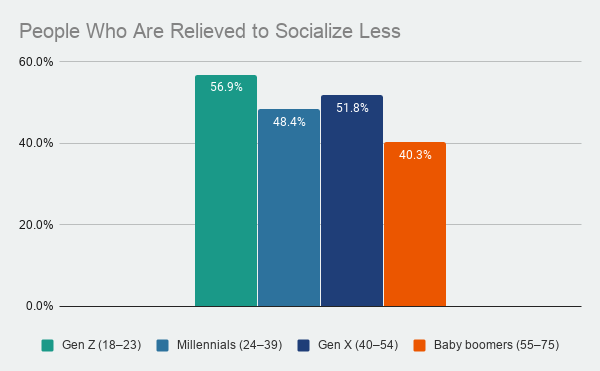
On average, more than half of all respondents under the age of 55 are relieved to be able to socialize less due to social distancing restrictions. Generation Z (between age 18 and 23) respondents are the most relieved, at 56.9%, followed by Generation X (between age 40 and 54) at 51.8%. Millennials (between age 24 and 39) are slightly less relieved than their parents, at 48.4%.
Of all four generations, baby boomers are the least relieved by social distancing restrictions due to the coronavirus crisis, as only 40.3% of baby boomer respondents reported feeling relieved to be required to socialize less.
I feel less lonely because I don’t feel the pressure to go out and socialize. I am free to be myself – which means I can spend less time around people without feeling the guilt I normally would feel. I actually feel as if I am thriving more and have less anxiety.
I am a registered nurse as well, so I am still working, although I’m working less. The only anxiety I have is about being exposed to the virus itself. Otherwise, life is good! Also, focusing more on a few friends and family (the few people who mean a lot to me) has helped me feel closer to them and made me realize how grateful I am for them.
– Hanna, Michigan
Additional Social Anxiety Resources
9. Young People Worry About Going Back into Society After the Lockdown
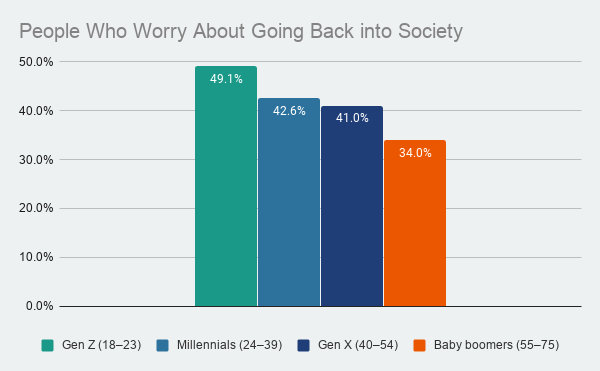
Respondents under age 55 disproportionately feel more anxiety about returning to normal society after lockdown. Of Generation Z respondents, 49.1% reported feeling worried about going back into society after social distancing restrictions are lifted. Of millennial respondents between 24 and 39, 42.6% reported feeling anxious. Generation X (between 40 and 54) reported only slightly less anxiety at 41%. Of baby boomer respondents, only 34% reported increased anxiety about returning to society after lockdown restrictions are lifted.
The thing I’m most anxious about is how I will be able to go outside again. I forgot how to interact with people and how to act. Going back to college scares me the most.
10. Younger Generations’ Social Anxiety Might Make Them Appreciate the Lockdown More
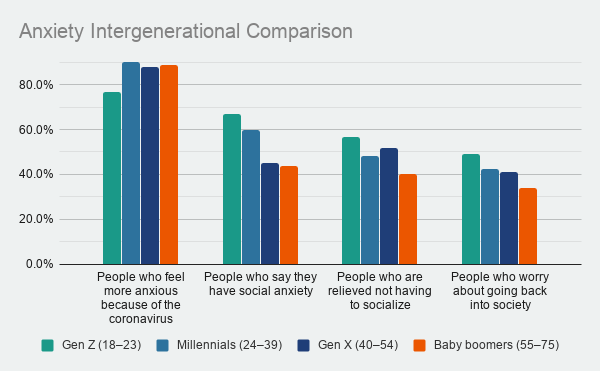
All four generations of respondents reported being deeply affected by increased anxiety because of the coronavirus situation. When comparing the respondents’ answers to all four of these questions across generations, it seems to indicate that younger respondents who have more social anxiety are more likely to be relieved to socialize less and worry more about returning to society.
Despite the fact that baby boomer (age 55 to 76) respondents report just as much increased anxiety (88.8%) as millennials and Generation X (90.2% and 88%, respectively), boomers are much less grateful for the break from socialization and have much less fear about returning to society. Fewer baby boomers responded to the survey than any other generation in the chart.
Generation X (age 40 to 54) respondents report high levels of increased anxiety due to the coronavirus situation (88%), lower levels of social anxiety than their Generation Z and millennial counterparts, are more likely than millennials (but less likely than Generation Z) to feel relieved about socializing less (51.8%), and worry only slightly less than millennials about returning to society (41%).
Millennial respondents report the most increased anxiety due to the coronavirus situation (90.2%), but were still slightly less likely than Generation Z to have social anxiety, feel relief from having to socialize less (48.4%), or worry about returning to society (42.6%).
Generation Z respondents, on the other hand, report less increased anxiety (77%) due to the coronavirus situation than other generations, but experience more social anxiety, more relief from the pressure of socialization (56.9%), and more worry about returning to society when lockdown restrictions are lifted (49.1%).
Over the fall I returned home and opted into online classes as I was dealing with immense social pressures and social anxiety. I had been doing well in my classes but I felt lonely being stuck at home all day without a car or anywhere to go.
Now that everyone is in the same online class boat as me I feel much better about my decision as a whole and having family around all day everyday is making me feel better each day. I feel like I am getting my confidence back and I’m trying new things.
11. People with Social Anxiety Are Relieved Not Having to Socialize and Are Worried About Returning to Society
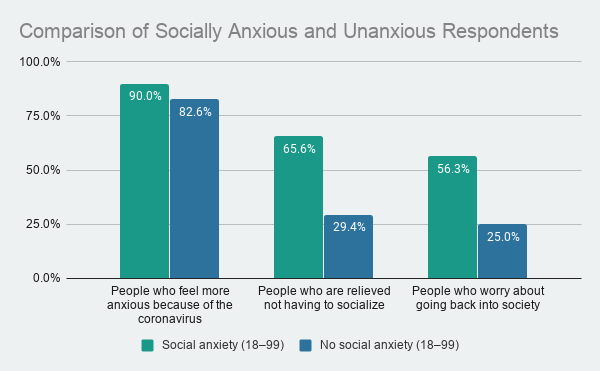
While most respondents are more anxious because of the coronavirus situation, those who identify as socially anxious (of any generation) are more than twice as likely to be relieved by social distancing requirements that enable them to socialize less, and twice as likely to worry about returning to society than those respondents who don’t identify as socially anxious.
12. Women Are More Anxious Than Men About the Coronavirus Crisis
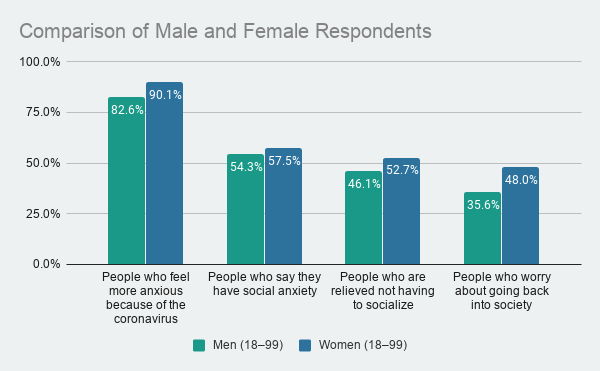
Of the female respondents, 90.1% report feeling more anxious due to the coronavirus situation compared to 82.6% of male respondents reporting the same. Women also report more social anxiety than men (57.5% to 54.3% respectively).
Men report less relief in socializing less (46.1%) than women (52.7%), meaning that more than half of the female respondents are grateful for the effects of social distancing requirements, but less than half of the male respondents report the same. Women who responded worry far more about returning to society (48%) than men (35.6%).
Demographics of Respondents
Age Distribution
| 18–23 (Generation Z) | 269 | 21.9% |
| 24–39 (Millennials) | 541 | 44.1% |
| 40–54 (Generation X) | 251 | 20.4% |
| 55–75 (Baby Boomers) | 160 | 13.0% |
| 76+ (Greatest/Silent Generation) | 7 | 0.6% |
| Total | 1,228 | 100.0% |
Geographic Distribution
| Country | Number of Respondents by Country (18+) | Distribution of respondents by Country |
| United States | 832 | 68.3% |
| United Kingdom | 79 | 6.5% |
| Canada | 49 | 4.0% |
| India | 38 | 3.1% |
| Sweden | 30 | 2.5% |
| Australia | 25 | 2.1% |
| Other | 165 | 13.5% |
| Total | 1,218 | 100.0% |
Tables and Data
How We Define Coronavirus Loneliness
In this report, we asked the question, “Do you feel more lonely because of the coronavirus?” The alternatives presented to respondents were Always, Often, Sometimes, or Never.
Respondents who chose Always or Often were categorized as experiencing coronavirus loneliness.
Table 8. Do you have social anxiety?
| All 18–99 n. | All 18–99 % | 18–23 n. | 18–23 % | 24–39 n. | 24–39 % | 40–54 n. | 40–54 % | 55–75 n. | 55–75 % | |
| Yes (combined) | 688 | 56.2% | 179 | 66.8% | 324 | 60.0% | 113 | 45.0% | 70 | 43.8% |
| No (combined) | 537 | 43.8% | 89 | 33.2% | 216 | 40.0% | 138 | 55.0% | 90 | 56.3% |
| Yes, I know I have social anxiety | 295 | 24.1% | 71 | 26.5% | 155 | 28.7% | 47 | 18.7% | 22 | 13.8% |
| Yes, I think I have social anxiety | 393 | 32.1% | 108 | 40.3% | 169 | 31.3% | 66 | 26.3% | 48 | 30.0% |
| No, I don’t think I have social anxiety | 321 | 26.2% | 66 | 24.6% | 135 | 25.0% | 76 | 30.3% | 42 | 26.3% |
| No, I know I don’t have social anxiety | 216 | 17.6% | 23 | 8.6% | 81 | 15.0% | 62 | 24.7% | 48 | 30.0% |
| Total | 1,225 | 100.0% | 268 | 100.0% | 540 | 100.0% | 251 | 100.0% | 160 | 100.0% |
Table 9. Are you relieved not having to socialize because of the lockdown?
| All 18–99 n. | All 18–99 % | 18–23 n. | 18–23 % | 24–39 n. | 24–39 % | 40–54 n. | 40–54 % | 55–75 n. | 55–75 % | |
| Yes (combined) | 610 | 49.8% | 153 | 56.9% | 261 | 48.4% | 130 | 51.8% | 64 | 40.3% |
| No (combined) | 614 | 50.2% | 116 | 43.1% | 278 | 51.6% | 121 | 48.2% | 95 | 59.7% |
| Yes, a lot | 143 | 11.7% | 37 | 13.8% | 61 | 11.3% | 33 | 13.1% | 12 | 7.5% |
| Yes, somewhat | 467 | 38.2% | 116 | 43.1% | 200 | 37.1% | 97 | 38.6% | 52 | 32.7% |
| No, mostly not | 356 | 29.1% | 71 | 26.4% | 166 | 30.8% | 65 | 25.9% | 52 | 32.7% |
| No, not at all | 258 | 21.1% | 45 | 16.7% | 112 | 20.8% | 56 | 22.3% | 43 | 27.0% |
| Total | 1,224 | 100.0% | 269 | 100.0% | 539 | 100.0% | 251 | 100.0% | 159 | 100.0% |
Table 10. Do you worry about going back into society after the lockdown?
| All 18–99 n. | All 18–99 % | 18–23 n. | 18–23 % | 24–39 n. | 24–39 % | 40–54 n. | 40–54 % | 55–75 n. | 55–75 % | |
| Yes (combined) | 520 | 42.5% | 131 | 49.1% | 230 | 42.6% | 103 | 41.0% | 54 | 34.0% |
| No (combined) | 703 | 57.5% | 136 | 50.9% | 310 | 57.4% | 148 | 59.0% | 105 | 66.0% |
| Yes, a lot | 147 | 12.0% | 38 | 14.2% | 66 | 12.2% | 28 | 11.2% | 13 | 8.2% |
| Yes, somewhat | 373 | 30.5% | 93 | 34.8% | 164 | 30.4% | 75 | 29.9% | 41 | 25.8% |
| No, mostly not | 386 | 31.6% | 88 | 33.0% | 167 | 30.9% | 80 | 31.9% | 50 | 31.4% |
| No, never | 317 | 25.9% | 48 | 18.0% | 143 | 26.5% | 68 | 27.1% | 55 | 34.6% |
| Total | 1,223 | 100.0% | 267 | 100.0% | 540 | 100.0% | 251 | 100.0% | 159 | 100.0% |
Table 11. Distribution by social anxiety
| Do you have social anxiety? | Social Anxiety 18–99 n. | Social Anxiety 18–99 % | No Social Anxiety 18–99 n. | No Social Anxiety 18–99 % |
| Yes (combined) | 688 | 100.0% | 0 | 0.0% |
| No (combined) | 0 | 0.0% | 537 | 100.0% |
| Yes, I know I have social anxiety | 295 | 42.9% | 0 | 0.0% |
| Yes, I think I have social anxiety | 393 | 57.1% | 0 | 0.0% |
| No, I don’t think I have social anxiety | 0 | 0.0% | 321 | 59.8% |
| No, I know I don’t have social anxiety | 0 | 0.0% | 216 | 40.2% |
| Total | 688 | 100.0% | 537 | 100.0% |
| Do you feel more anxious because of the coronavirus? | Social Anxiety 18–99 n. | Social Anxiety 18–99 % | No Social Anxiety 18–99 n. | No Social Anxiety 18–99 % |
| Always/Often/Sometimes | 619 | 90.0% | 443 | 82.6% |
| Always | 138 | 20.1% | 71 | 13.2% |
| Never | 69 | 10.0% | 93 | 17.4% |
| Often | 228 | 33.1% | 127 | 23.7% |
| Sometimes | 253 | 36.8% | 245 | 45.7% |
| Total | 688 | 100.0% | 536 | 100.0% |
| Are you relieved not having to socialize because of the lockdown? | Social Anxiety 18–99 n. | Social Anxiety 18–99 % | No Social Anxiety 18–99 n. | No Social Anxiety 18–99 % |
| Yes (combined) | 451 | 65.6% | 157 | 29.4% |
| No (combined) | 237 | 34.4% | 377 | 70.6% |
| Yes, a lot | 110 | 16.0% | 33 | 6.2% |
| Yes, somewhat | 341 | 49.6% | 124 | 23.2% |
| No, mostly not | 161 | 23.4% | 195 | 36.5% |
| No, not at all | 76 | 11.0% | 182 | 34.1% |
| Total | 688 | 100.0% | 534 | 100.0% |
| Do you worry about going back into society after the lockdown? | Social Anxiety 18–99 n. | Social Anxiety 18–99 % | No Social Anxiety 18–99 n. | No Social Anxiety 18–99 % |
| Yes (combined) | 387 | 56.3% | 133 | 25.0% |
| No (combined) | 301 | 43.8% | 400 | 75.0% |
| Yes, a lot | 112 | 16.3% | 35 | 6.6% |
| Yes, somewhat | 275 | 40.0% | 98 | 18.4% |
| No, mostly not | 211 | 30.7% | 174 | 32.6% |
| No, never | 90 | 13.1% | 226 | 42.4% |
| Total | 688 | 100.0% | 533 | 100.0% |
Table 12. Distribution by gender
| Do you feel more anxious because of the coronavirus? | Men
18–99 n. |
Men
18–99 % |
Women 18–99 n. | Women 18–99 % |
| Always/Often/Sometimes (combined) | 446 | 82.6% | 598 | 90.1% |
| Always | 72 | 13.3% | 134 | 20.2% |
| Never | 94 | 17.4% | 66 | 9.9% |
| Often | 132 | 24.4% | 219 | 33.0% |
| Sometimes | 242 | 44.8% | 245 | 36.9% |
| Total | 540 | 100.0% | 664 | 100.0% |
| Do you have social anxiety? | Men
18–99 n. |
Men
18–99 % |
Women 18–99 n. | Women 18–99 % |
| Yes (combined) | 293 | 54.3% | 381 | 57.5% |
| No (combined) | 247 | 45.7% | 282 | 42.5% |
| No, I don’t think I have social anxiety | 155 | 28.7% | 160 | 24.1% |
| No, I know I don’t have social anxiety | 92 | 17.0% | 122 | 18.4% |
| Yes, I know I have social anxiety | 116 | 21.5% | 169 | 25.5% |
| Yes, I think I have social anxiety | 177 | 32.8% | 212 | 32.0% |
| Total | 540 | 100.0% | 663 | 100.0% |
| Are you relieved not having to socialize because of the lockdown? | Men
18–99 n. |
Men
18–99 % |
Women 18–99 n. | Women 18–99 % |
| Yes (combined) | 249 | 46.1% | 349 | 52.7% |
| No (combined) | 291 | 53.9% | 313 | 47.3% |
| No, mostly not | 167 | 30.9% | 182 | 27.5% |
| No, not at all | 124 | 23.0% | 131 | 19.8% |
| Yes, a lot | 50 | 9.3% | 89 | 13.4% |
| Yes, somewhat | 199 | 36.9% | 260 | 39.3% |
| Total | 540 | 100.0% | 662 | 100.0% |
| Do you worry about going back into society after the lockdown? | Men
18–99 n. |
Men
18–99 % |
Women 18–99 n. | Women 18–99 % |
| Yes (combined) | 192 | 35.6% | 318 | 48.0% |
| No (combined) | 347 | 64.4% | 344 | 52.0% |
| No, mostly not | 182 | 33.8% | 196 | 29.6% |
| No, never | 165 | 30.6% | 148 | 22.4% |
| Yes, a lot | 51 | 9.5% | 94 | 14.2% |
| Yes, somewhat | 141 | 26.2% | 224 | 33.8% |
| Total | 539 | 100.0% | 662 | 100.0% |
A Letter from the Author
April 2020
Several studies have been made on loneliness. But what effect does the coronavirus lockdown have on loneliness in the US and globally?
In our previous report, written together with 15 psychologists and loneliness experts, we looked at how to tackle millennial loneliness.
This report, based on our survey of 1,228 adults, confirms trends shown in previous surveys and adds new findings. A 2019 survey conducted by the insurance company Cigna found that younger generations are lonelier than older generations. A 2018 UK national survey found that 22% of millennials report having no friends and that 30% often feel lonely. In comparison, 15% of baby boomers report that they often feel lonely.
This report shows that millennials are significantly lonelier because of the coronavirus than baby boomers. Of millennial respondents, 34% (compared to 20% of baby boomers) say that they experience more loneliness because of the coronavirus situation.
The report also shows that the US is more affected than the non-US world average in terms of loneliness because of the lockdown.
There is also a significant gender difference. Of the men who responded, 30.6% (compared to 25.7% of women) often or always feel more lonely because of the coronavirus situation.
My hope is that this report improves understanding and helps leaders in their decision-making in regard to lockdown-related loneliness.
Sincerely,
Viktor Sander, counselor at SocialSelf
About SocialSelf
The mission of SocialSelf is to help readers build confidence, enjoy socializing, and develop meaningful connections.
The company works together with psychologists and doctors to provide actionable, well-researched, and accurate information.
SocialSelf was founded in Sweden 2012. Today, it operates from offices in Sweden and New York. Today, the company has 250,000 monthly readers and more than 60,000 newsletter readers.
Learn more about SocialSelf’s scientific review board.